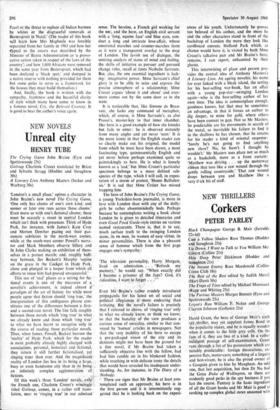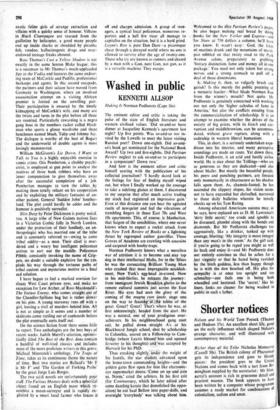NEW THRILLERS
Corkers
PETER PARLEY
Black Champagne George B. Mair (Jarrolds 22s 643) - Cast a Yellow Shadow Ross Thomas (Hodder and Stoughton 25s)
Lie Down, I Want to Talk to You William Mc- --Giver-Tr (Collins-21s) Skin Deep Pelei Dickinson (Hodder and Stoughton 21s)
The Instant Enemy Ross Macdonald (Collins Crime Club 18s)
The Bei! -;91 the Best edited by Judith Merril
(Hart-Davis 50s) - - The Traps of Time edited by Michael Moorcock (Rapp and Whiting 25s) The Furious Masters Margot Bennett (Eyre and Spottiswoode 25s)
Logan's Run William F. Nolan and _George Clayton Johnson (Gollaricz 21s)
David Grant, the hero of George Mair's sixth `spy thriller, may yet supplant James Bond in the popularity stakes, and he is equally wooden when it comes to the little grey cells. On the face of it, they are two of a kind. In a rather indulgent passage of self-examination, Grant runs _through a list of his possessions_ which are notably predietable: foreign decorations, ex- pensive flats, motor-cars; something of a linguist and bon-vivant, he is also the proud owner of a Gauguin given to him by Maugham. An odd one, that last acquisition, but then Dr No had the Goya Duke of Wellington, so there are evidently good perks in the spy business if you last the course. Fantasy is the basic ingredient of all the Grant books and Mr Mair is good at cooking up complex global stews seasoned with exotic feline girls of strange extraction and villains with a quirky sense of honour. Villains in Black Champagne are rescued from the guillotine by helicopter, a good many people end up inside sharks or shredded by piranha fish, voodoo, hallucinogenic drugs and over- endowed teenage freaks abound.
Ross Thomas's Cast a Yellow Shadow is not exactly in the same Sexton Blake league; this is a successor to Mr Thomas's much-applauded Spy in the Vodka and features the same endear- ing team of McCorkle and Padillo, professional barkeeps and agents. In this second escapade, the partners and their saloon have moved from Germany to Washington, where an involved assassination attempt on a visiting African premier is foisted on the unwilling pair.
Their participation is ensured by the timely kidnapping of McCorkle's wife, and many are the twists and turns in the plot before all three are reunited. Particularly rewarding is a negro gang boss in the numbers racket called Hard- man who sports a glossy wardrobe and three henchmen named Mush, Tulip and Johnny Jay. The dialogue is worthy of the best of Bogart and the underworld of double agents is most lovingly manoeuvred.
William McGivern's Lie Down, I Want to Talk to You is a highly enjoyable exercise in comic crime. Otis Pemberton, a chubby psychi- atrist, is employed at gun point to analyse the motives of three bank robbers who have an inner compunction to give themselves away after the successful completion of a job. Pemberton manages to turn the tables, by making them totally reliant on his cooperation and by exploiting the military fantasies of an- other patient, General 'Sudden John' Souther- land. The plot could hardly be odder and the humour is positively surrealist.
Skin Deep by Peter Dickinson is pretty weird, too. A large tribe of New Guinea natives lives in a Victorian Gothic folly in North London, under the protection of their landlady, an an- thropologist who has married one of the tribe and is constantly referred to—owing to some tribal oddity—as a man. Their chief is mur- dered and a weary but intelligent policeman arrives to sort out the muddle. Policeman
Pibble, constantly invoking the name of Crip- pen, no doubt a suitable expletive for the CID,
plods his way through the tortuous paths of tribal custom and mysterious motive to a final sad solution.
I have begun to feel a marked aversion for sleazy West Coast private eyes, and make no exception for Lew Archer, of Ross Macdonald's The Instant Enemy, who comes straight .out of the Chandler-Spillane bag but is rather slOwar on his pins. A young tearaway runs off with a girl, leaving-a trail of murders behind him. All is not as simple as it seems and a number of skeletons come rattling out of cupboards before the plot eventually sorts itself out. On the science fiction front there seems little to report. Two anthologies are the best buys of recent weeks. Judith Merril's selection, optiMis- tically titled The Best of the Best, does contain a handful of well-tried classics and includes most of the more proficient writers in this genre.
Michael Moorcock's anthology, The Traps of Time, takes as its continuous theme the nature of time. Best two stories are Ballard's 'Mr F is Mr F' and `The Garden of Forking Paths' by the great Jorge Luis Borges.
The two sci-fi novels are unfortunately poor stuff. The Furious Masters deals with a spheriCal object found on an English moor which re- sembles a moon-surveyor and is rapidly ex- ploited by a smart local farmer who fences it off and charges admission. A group of teen- agers, a cynical local policeman, numerous re- porters and a hell fire vicar all manage to capitalise on the situation, but it is .a hard grind. Logan's Run is pure Dan Dare—a picaresque chase through a decayed world where no one is allowed to survive after the age of twenty-one. Those who try are known as runners and chased by a man with a Gun, note Gun, not gun, as it is a versatile machine. They escape.



































 Previous page
Previous page